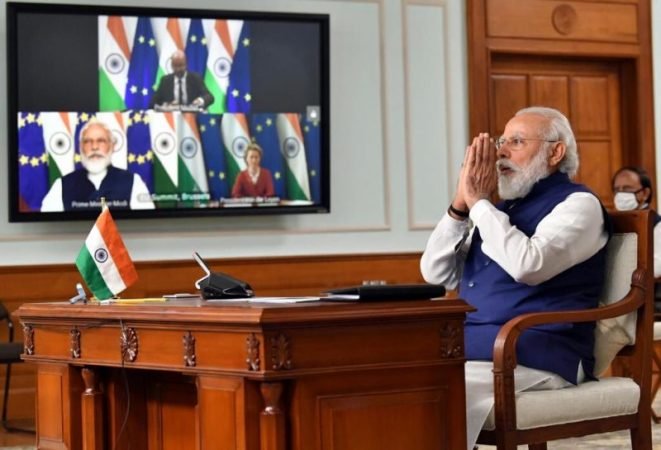India-EU Summit: Cooperation and Coordination

The 15th India-European Union Summit took place on Wednesday, the 15th of July 2020, and was held in a virtual medium owing to the worldwide circumstances brought about by the COVID-19 pandemic. This meeting was co-chaired by Narendra Modi, the Prime Minister of India and Charles Michel, the President of the European Council; and Ursula von der Leyen, the President of the European Commission. The previous meeting, the 14th Summit was held in New Delhi on the 6th of October, 2017. This edition of the Summit revolved around the agenda of reviewing India-EU cooperation concerning political and security relations, trade, investment, and economic cooperation with respect to the global pandemic and other contemporary issues of interest.
Prior to the Summit, India and the European Atomic Energy Community (Euratom) on Tuesday also sealed a civil nuclear cooperation agreement, focused on research and development for peaceful uses of nuclear energy. PM Modi called the India-EU Summit extremely fruitful while deliberating on issues of utmost importance ranging from multilateralism to digital economy. In his opening remarks, PM Narendra Modi suggested an action-oriented agenda to further expand ties between India and the EU and laid stress on greater cooperation to deal with the new economic problems that have emerged globally in the wake of COVID-19. This Summit yielded successful results which can be categorized into the EU-India Joint Declaration on Resource Efficiency and Circular Economy, the India-EU Strategic Partnership: A Roadmap to 2025, and the Joint Statement of the 15th India-EU Summit.
EU-India Joint Declaration on Resource Efficiency and Circular Economy
In the previous edition of the Summit, India and the EU adopted The Joint Statement in 2017 which mentioned the ambition to “reconcile economic growth and environmental protection”. Acknowledging the common environmental challenges so faced and the need to work together to improve the same, the leaders deliberated on the need to adopt a more sustainable and conscious approach to environmental protection in the Summit. In the context of post-pandemic economic recovery efforts that can provide an opportunity to accelerate a transition, they agreed on enhancing resource efficiency and moving towards a more circular economic model and sustainable alternatives.
Successful implementation of the 2030 Agenda for Sustainable Development and Sustainable Development Goals is achievable only after both the sides take strong actions with substantial contribution to the Nationally Determined Contributions (NDC) commitments of both sides under the Paris Agreement as well as to a more sustainable energy system. Previously, some steps taken by the two include the ‘European Green Deal’, the new growth strategy for Europe, and the ‘Strategy on Resource Efficiency’, prepared by the National Institution for Transforming India (NITI) Aayog. As per the declaration, both sides will bear their own expenses arising from the cooperation activities carried out under this Joint Declaration and the proposed Partnership.
India-EU Strategic Partnership: A Roadmap to 2025
A common five-year roadmap called the “India-EU Strategic Partnership: A Roadmap to 2025” was endorsed by the two “unions of diversity” to improve relations and formulate a Strategic Partnership. This roadmap concerns various elements revolving around Foreign Policy, Security, Human Rights, ICT development, and Employment Policy, amongst a plethora of others to improve relations across the oceans. Balanced, ambitious and mutually-beneficial trade and investment agreements with political guidance marked the gist of this partnership, and Ursula von der Leyen, the President of the European Commission expressed a proposal to establish a common digital investment forum.
The need to promote a transparent, viable, inclusive and comprehensive approach that is rule-based was suggested. This would ensure that projects are fair and sustainable in all aspects.
With reference to the civil nuclear cooperation agreement, the President of EU, Charles Michel stated, “We have just signed the Euratom-India Agreement that boosts cooperation on research and development for peaceful nuclear energy. We welcome India’s proposal to build a connectivity partnership that is open, sustainable and rules-based.”

Joint Statement of the 15th India-EU Summit
The EU welcomed India’s election as a non-permanent member of the United Nations Security Council (2021-22) and G20 Chair in 2022. During the Summit, the leaders agreed on the need to foster India-EU Strategic Partnership that shared core values pertaining to democracy, respect for human rights, rule of law, freedom, and maximising benefits for the citizens in India and the EU alike. They agreed to bolster their cooperation in the international arena keeping in mind the ideals of the United Nations (UN) and the World Trade Organization (WTO). The pandemic has highlighted the need for preparedness for health crises around the globe, and the leaders have agreed to cooperate on the same to resolve global health emergencies, enhance economic stability and implement the Sustainable Development Goals while protecting the climate and environment with the idea of sustainable modernisation in mind.
The EU welcomed the European Investment Bank activity and the upcoming planned investments of €550 million in the Pune and Bhopal Metro Rail Projects while recognising the importance of incentivising sustainable private financing. India and the EU reiterated their commitment to human rights, gender equality and women empowerment, in all spheres of life, and the importance they attach to their cooperation. They endeavoured to increase and improve interaction in international fora, in particular, the UN General Assembly and the UN Human Rights Council and looked forward to the next session of their dialogue to be held in New Delhi in a post-pandemic climate.


















